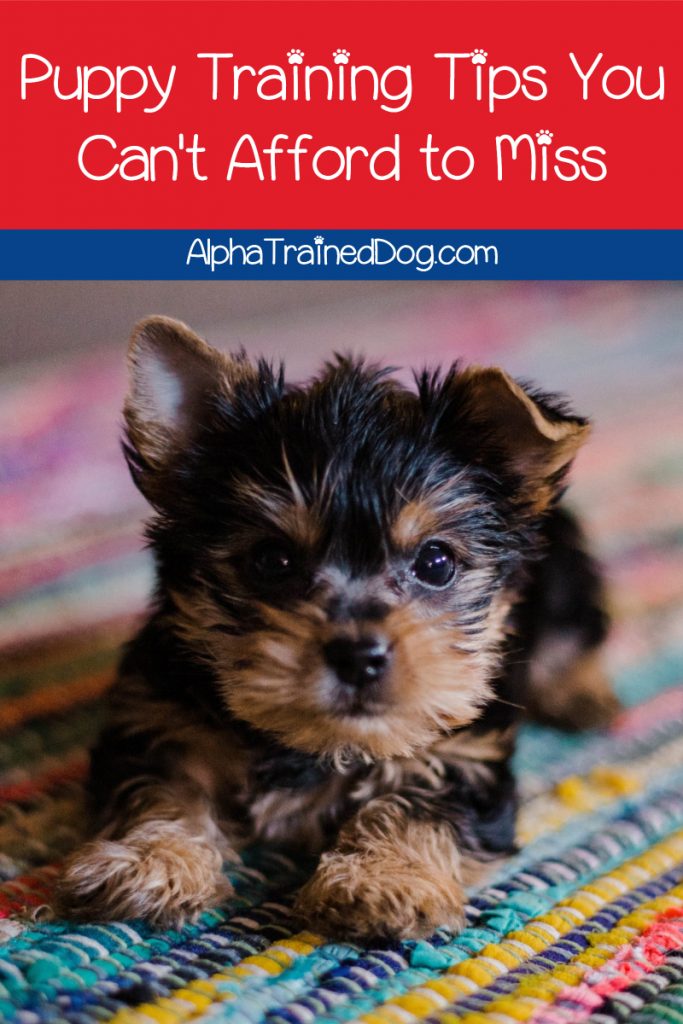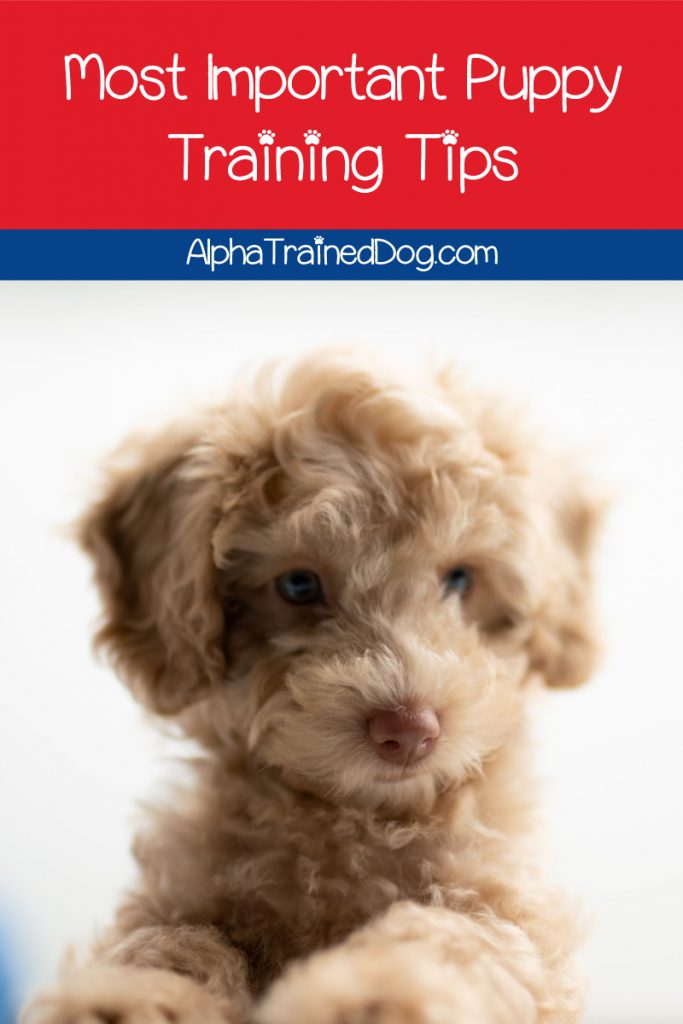If you’re looking for the most important puppy training tips to get you started, we’ve got you covered!
Below, we’ll talk about some of the basic things every dog should know.
We’ll also discuss the needs of different breeds when it comes to training.
Consider this a crash course on teaching your new pup to behave!
Related: Best TIPS FOR Training your Golden Retriever

Puppy Training for Different Breeds & Needs
Puppies certainly bring loads of joy into your home but it’s not all fun and games.
Training is serious business! Make no mistake about it, you will have to work hard at first.
I think the best place to start our journey is at the beginning, with your dog’s breed.
See, different breeds really do have different training needs! Let’s take a quick peek and you’ll see what I mean.
Working dogs
Working breeds like the Mastiff, Boxer, and Doberman need to feel like they’re accomplishing a task to feel truly fulfilled.
Your training methods should reflect that. Along with basic obedience lessons, make sure you include some enrichment activities that give them a sense of accomplishment.
Herding dogs
Herding breeds like border collies, German Shepherds, and such are very similar to working dogs with one exception- their job is to herd cattle and sheep.
In the absence of those animals, they’ll attempt to herd your other pets and children.
While my Shepherd was a perfectly gentle herder of my son, if you don’t want this behavior, you’ll have to train it out of them.
Just remember, it’s instinct, so a herder will never NOT be a herder at heart.
Sporting Group
Spaniels, retrievers, and setters are all part of the sporting group (they’re also often called “gun dogs” because hunters use them).
These guys love to goof off and have fun, but they get down to business when it’s time to work. Incorporate their love of the hunt into training by setting up treasure hunts for them!
Terrier Group
Pretty much any dog with the word “terrier” in his name belongs to this group.
While they vary in terms of stubbornness, for the most part they’re very head-strong dogs.
Reward training works best because a task needs to be worth their effort before they’ll even consider it.
Hound Group
Along with all breeds with the word “hound” in their names, other members of this ground include the Beagle, Borzoi, and Saluki.
They may be sighthounds, scenthounds, or just plain houndhounds (oddly, there is no soundhound, but wouldn’t that be neat?) but they all have one thing in common- willpower and tenacity.
Bred to think independently, these dogs are NOT people pleasers, so reward training is literally the ONLY thing that truly works.
Of course, these are generalizations. Every dog is unique.
FREQUENTLY ASKED QUESTIONS ABOUT PUPPY TRAINING
Below are some frequently asked questions along with their answers about training a puppy.
When should I start training my puppy?
It’s best to start training your puppy as early as possible, ideally between 8 to 12 weeks of age. Puppies have a critical learning period during this time, and early training sets the foundation for their behavior and obedience as they grow.
DO I REALLY NEED TO TRAIN MY DOG?
Yes, at least to some degree! Unless, of course, you want your whole house to become a toilet and your expensive furniture torn to shreds.
.Puppies are like babies and need to be taught the difference between right and wrong, to do this you need some training!
How long should training sessions be?
Puppies have short attention spans, so it’s important to keep training sessions short and engaging, typically around 10 to 15 minutes. Multiple short sessions throughout the day are more effective than one long session.
DO I HAVE TO BUY ANY FANCY TOOLS?
While there are tons of great products and training tools out there to make the job easier, you don’t actually need any of them.
The only thing I’d say you really need is a good training treat, as most dogs are food-motivated.
What training methods should I use?
Positive reinforcement is the most effective and humane training method. Reward your puppy with treats, praise, and play for good behavior. Avoid punishment or harsh corrections, as they can be counterproductive and damage the trust between you and your puppy.
HOW LONG DOES IT TAKE TO TRAIN A PUPPY?
As we said above, a puppy may take several months to train. It really depends on your dog’s personality.
Just remember to keep at it and reinforce their training once they master a command.
Basic Puppy Training Tricks & Tips

Since we’ve covered and will continue to cover specific training methods, we’re not going to get super detailed here.
Instead, let’s go over a few things to keep in mind regardless of your dog’s breed.
1. Start with socialization:
Early socialization is crucial for puppies to develop into confident and friendly adult dogs. Introduce your puppy to various environments, people, dogs, and other animals. Expose them to different sights, sounds, and experiences to build their resilience and prevent future behavior problems.
2. Establish a consistent routine:
Dogs thrive on routine, so establish a consistent schedule for feeding, exercise, playtime, and training sessions. A predictable routine helps your puppy feel secure and enables them to learn faster. Consistency is key to reinforcing good behavior and establishing boundaries.
3. Positive reinforcement is key:
Positive reinforcement is the most effective training method for puppies. Reward desired behaviors with treats, praise, and affection. This approach encourages your puppy to repeat those behaviors. Avoid punishment or harsh corrections, as they can create fear or aggression.
4. Teach basic commands:
Start with basic commands like sit, stay, come, and down. Break down each command into simple steps and use consistent verbal cues and hand signals. Be patient and keep training sessions short and fun to maintain your puppy’s interest. Celebrate every small achievement to boost their confidence.
5. Address chewing and biting:
Puppies explore the world with their mouths, so it’s important to redirect their chewing behavior to appropriate toys. Provide a variety of chew toys and discourage them from biting on furniture or hands. If your puppy nips or bites, yelp loudly and withdraw attention to teach them that biting is not acceptable.
6. Practice crate training:
Crate training provides a safe and comfortable space for your puppy and helps with potty training. Introduce the crate gradually, making it a positive experience with treats and toys. Use the crate for short periods initially and gradually increase the time. Never use the crate as a form of punishment.
7. Be patient and consistent:
Remember, training takes time and patience. Some days will be more challenging than others, but consistency is crucial. Set realistic expectations and celebrate every small victory. Seek guidance from professional trainers if needed, and don’t forget to shower your puppy with love and affection throughout the training process.
By following these seven basic puppy training tips – socialization, routine, positive reinforcement, basic commands, addressing chewing and biting, crate training, and patience – you’ll set the foundation for a well-behaved and happy dog.
Check out some of our other training articles if you need more specific tips. I recommend starting with the most common types of training and going from there.


Trackbacks/Pingbacks